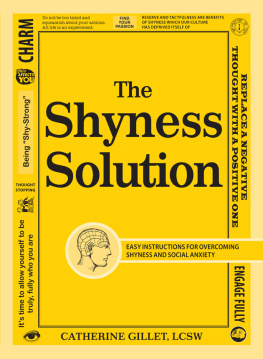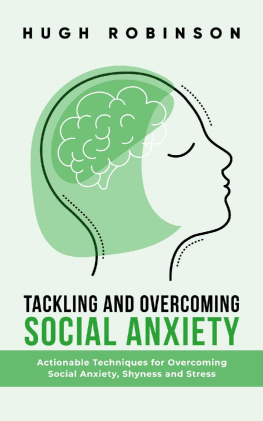Gillian Butler - Overcoming Social Anxiety and Shyness
Here you can read online Gillian Butler - Overcoming Social Anxiety and Shyness full text of the book (entire story) in english for free. Download pdf and epub, get meaning, cover and reviews about this ebook. year: 2009, publisher: by Gillian Butler, genre: Politics. Description of the work, (preface) as well as reviews are available. Best literature library LitArk.com created for fans of good reading and offers a wide selection of genres:
Romance novel
Science fiction
Adventure
Detective
Science
History
Home and family
Prose
Art
Politics
Computer
Non-fiction
Religion
Business
Children
Humor
Choose a favorite category and find really read worthwhile books. Enjoy immersion in the world of imagination, feel the emotions of the characters or learn something new for yourself, make an fascinating discovery.

- Book:Overcoming Social Anxiety and Shyness
- Author:
- Publisher:by Gillian Butler
- Genre:
- Year:2009
- Rating:4 / 5
- Favourites:Add to favourites
- Your mark:
- 80
- 1
- 2
- 3
- 4
- 5
Overcoming Social Anxiety and Shyness: summary, description and annotation
We offer to read an annotation, description, summary or preface (depends on what the author of the book "Overcoming Social Anxiety and Shyness" wrote himself). If you haven't found the necessary information about the book — write in the comments, we will try to find it.
Overcoming Social Anxiety and Shyness — read online for free the complete book (whole text) full work
Below is the text of the book, divided by pages. System saving the place of the last page read, allows you to conveniently read the book "Overcoming Social Anxiety and Shyness" online for free, without having to search again every time where you left off. Put a bookmark, and you can go to the page where you finished reading at any time.
Font size:
Interval:
Bookmark:
GILLIAN BUTLER is a Fellow of the British Psychological Society and a founder member of the Academy of Cognitive Therapy. She works both for the NHS and for Oxford Cognitive Therapy Centre. Through ten years of clinical research with the University of Oxford, she helped to develop and evaluate cognitive behavioral treatments for social phobia and for Generalized Anxiety Disorder. She has a special clinical interest in the use of CBT during recovery from traumatic experiences in childhood and runs training workshops on a wide variety of topics relevant to practitioners of CBT, in the UK and other countries. She is particularly interested in making the products of research available to the general public and, in addition to being the author of Overcoming Social Anxiety and Shyness, she is co-author of Manage Your Mind: The Mental Fitness Guide and of Psychology: A Very Short Introduction.
The aim of the Overcoming series is to enable people with a range of common problems and disorders to take control of their own recovery program. Each title, with its specially tailored program, is devised by a practicing clinician using the latest techniques of cognitive behavioral therapy techniques which have been shown to be highly effective in changing the way patients think about themselves and their problems. The series was initiated in 1993 by Peter Cooper, Professor of Psychology at Reading University and Research Fellow at the University of Cambridge in the UK whose original volume on overcoming bulimia nervosa and binge-eating continues to help many people in the USA, the UK and Europe.
Titles in the series include:
OVERCOMING ANGER AND IRRITABILITY
OVERCOMING ANXIETY
OVERCOMING BODY IMAGE PROBLEMS INCLUDING BODY DYSMORPHIC DISORDER
OVERCOMING BULIMIA NERVOSA AND BINGE-EATING
OVERCOMING GRIEF
OVERCOMING LOW SELF-ESTEEM
OVERCOMING OBSESSIVE COMPULSIVE DISORDER
OVERCOMING PANIC
OVERCOMING PARANOID AND SUSPICIOUS THOUGHTS
OVERCOMING SOCIAL ANXIETY AND SHYNESS
OVERCOMING TRAUMATIC STRESS
OVERCOMING WORRY
A self-help guide using Cognitive Behavioral Techniques

A Member of the Perseus Books Group
New York
Constable & Robinson Ltd
3 The Lanchesters
162 Fulham Palace Road
London W6 9ER
www.constablerobinson.com
First published in the UK by Robinson,
an imprint of Constable & Robinson Ltd, 1999
Copyright Gillian Butler, 1999
The right of Gillian Butler to be identified as the author of this work has been asserted by her in accordance with the Copyright, Designs and Patents Act, 1988.
All rights reserved. This book is sold subject to the condition that it shall not, by way of trade or otherwise, be lent, re-sold, hired out or otherwise circulated in any form of binding or cover other than that in which it is published and without a similar condition including this condition being imposed on the subsequent purchaser.
A copy of the British Library Cataloguing in Publication Data is available from the British Library.
Important Note
This book is not intended as a substitute for medical advice or treatment. Any person with a condition requiring medical attention should consult a qualified medical practitioner or suitable therapist.
ISBN 978-1-85487-703-1
Printed and bound in the EU
10 9
Table of contents
Acknowledgements
The ideas in this book have many sources, and my task has been to bring them together in a way that I hope will be useful. If the book achieves its aim then all these sources should be acknowledged, including the personal as well as the professional ones. Conversations about social anxiety with my family, friends, colleagues, students and patients have all contributed to the shape and content of this book, and these conversations have been going on, intermittently of course, since the early 1980s, when I first became interested in this subject. I have enjoyed them, and I have found them stimulating and interesting. More recent influences, however, have been especially important, and I would particularly like to acknowledge the innovative and creative ideas of four colleagues whose work on social anxiety has helped to change the way in which it can now be treated: David Clark, Melanie Fennell, Ann Hackmann and Adrian Wells.
Introduction
Why a cognitive behavioral approach?
Over the past two or three decades, there has been something of a revolution in the field of psychological treatment. Freud and his followers had a major impact on the way in which psychological therapy was conceptualized, and psychoanalysis and psychodynamic psychotherapy dominated the field for the first half of this century. So, long-term treatments were offered which were designed to uncover the childhood roots of personal problems offered, that is, to those who could afford it. There was some attempt by a few health service practitioners with a public conscience to modify this form of treatment (by, for example, offering short-term treatment or group therapy), but the demand for help was so great that this had little impact. Also, whilst numerous case histories can be found of people who are convinced that psychotherapy did help them, practitioners of this form of therapy showed remarkably little interest in demonstrating that what they were offering their patients was, in fact, helpful.
As a reaction to the exclusivity of psychodynamic therapies and the slender evidence for its usefulness, in the 1950s and 1960s a set of techniques was developed, broadly collectively termed behavior therapy. These techniques shared two basic features. First, they aimed to remove symptoms (such as anxiety) by dealing with those symptoms themselves, rather than their deep-seated underlying historical causes. Second, they were techniques, loosely related to what laboratory psychologists were finding out about the mechanisms of learning, which were formulated in testable terms. Indeed, practitioners of behavior therapy were committed to using techniques of proven value or, at worst, of a form which could potentially be put to the test. The area where these techniques proved of most value was in the treatment of anxiety disorders, especially specific phobias (such as fear of animals or heights) and agoraphobia, both notoriously difficult to treat using conventional psychotherapies.
After an initial flush of enthusiasm, discontent with behavior therapy grew. There were a number of reasons for this, an important one of which was the fact that behavior therapy did not deal with the internal thoughts which were so obviously central to the distress that patients were experiencing. In this context, the fact that behavior therapy proved so inadequate when it came to the treatment of depression highlighted the need for major revision. In the late 1960s and early 1970s a treatment was developed specifically for depression called cognitive therapy. The pioneer in this enterprise was an American psychiatrist, Professor Aaron T. Beck, who developed a theory of depression which emphasized the importance of peoples depressed styles of thinking. He also specified a new form of therapy. It would not be an exaggeration to say that Becks work has changed the nature of psychotherapy, not just for depression but for a range of psychological problems.
In recent years the cognitive techniques introduced by Beck have been merged with the techniques developed earlier by the behavior therapists to produce a body of theory and practice which has come to be known as cognitive behavior therapy. There are two main reasons why this form of treatment has come to be so important within the field of psychotherapy. First, cognitive therapy for depression, as originally described by Beck and developed by his successors, has been subjected to the strictest scientific testing; and it has been found to be a highly successful treatment for a significant proportion of cases of depression. Not only has it proved to be as effective as the best alternative treatments (except in the most severe cases, where medication is required), but some studies suggest that people treated successfully with cognitive behavior therapy are less likely to experience a later recurrence of their depression than people treated successfully with other forms of therapy (such as antidepressant medication). Second, it has become clear that specific patterns of thinking are associated with a range of psychological problems and that treatments which deal with these styles of thinking are highly effective. So, specific cognitive behavioral treatments have been developed for anxiety disorders, like panic disorder, generalized anxiety disorder, specific phobias and social phobia, obsessive compulsive disorders, and hypochondriasis (health anxiety), as well as for other conditions such as compulsive gambling, alcohol and drug addiction, and eating disorders like bulimia nervosa and binge-eating disorder. Indeed, cognitive behavioral techniques have a wide application beyond the narrow categories of psychological disorders: they have been applied effectively, for example, to helping people with low self-esteem and those with marital difficulties.
Next pageFont size:
Interval:
Bookmark:
Similar books «Overcoming Social Anxiety and Shyness»
Look at similar books to Overcoming Social Anxiety and Shyness. We have selected literature similar in name and meaning in the hope of providing readers with more options to find new, interesting, not yet read works.
Discussion, reviews of the book Overcoming Social Anxiety and Shyness and just readers' own opinions. Leave your comments, write what you think about the work, its meaning or the main characters. Specify what exactly you liked and what you didn't like, and why you think so.









